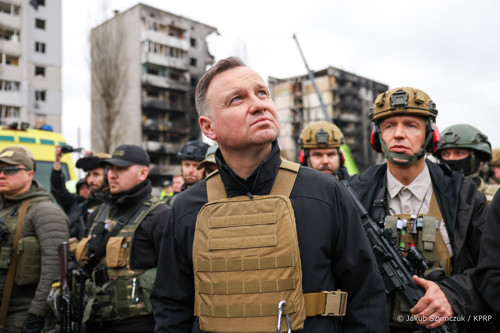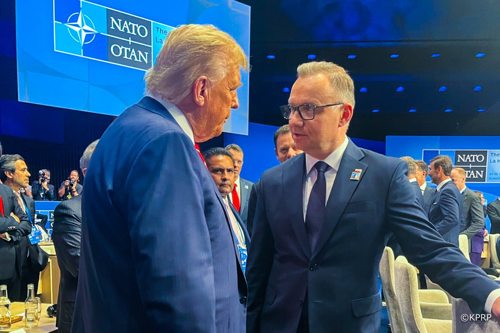
Three years ago, when Russia launched its full-scale invasion of Ukraine, I was helping raise money to send thermal blankets for families who had fled across the border into Poland. It wasn’t much—just a way to offer a bit of warmth and dignity to people whose lives had been turned upside down overnight.
I was inspired to join this small effort by the example set by Poland. While much of the world hesitated, Poland didn’t. Polish people opened their homes. Local leaders made quick, clear decisions. The country moved faster than almost any other country. Watching it all unfold reminded me what leadership looks like in a crisis—steady, driven by responsibility.
Little did I know then that three years later, I would be sitting across from President Duda of Poland discussing what it takes to lead in a time of war.
This fall, during my first month as a new scholar, I was humbled to be invited to meet President Duda during his visit to Oxford. As he approached, I said “Miło mi Pana poznać” to him who was pleasantly surprised and gestured warmly towards me. It is a simple “Nice to meet you” in Polish that I made a point to learn three years ago to show my respect for the people of Poland who had done something extraordinary.
I stayed behind and talked with the president late into the night after his public engagements at the Union. He spoke plainly about the real demands of leading under intense pressure. While specific details remain private, the larger lessons deserve to be shared. They reveal what it takes to lead with steadiness, conviction, and service when everything is on the line.

Sorting by Urgency, Not Drama
I asked President Duda how he decided what to deal with first during those first chaotic nights.
He paused and thought for a moment before answering. “You have to listen,” he said. “But not to the noise.”
He explained that in a crisis, everything feels urgent. Cabinet ministers and military generals came in and went out. The phone’s ringing every minute, someone’s waving another report in front of you, and the news never stops. Everyone wants an answer right away. But if you chase every loud voice, you lose track of what actually matters.
In those first few weeks, President Duda’s team learned to tell what was real and what was just panic. “Some problems come with shouting and pressure. Others don’t make a sound until it’s almost too late. “Those quiet ones,” he said, “they’re the ones that break things if you ignore them.”
His rule was simple: clear the obstacles first. Before he ever went on national television, he wanted to know the mayors had generators, that hospitals could keep running, and that volunteers knew where to go. “You can’t talk about hope if all the lights are out,” he said.
That line was very inspiring to me. Too often, leaders treat crises like theater to be measured in headlines and soundbites. But real leadership doesn’t feed on attention. It steadies people by restoring order first, then faith. President Duda’s point was simple but profound: in moments of fear, it’s easy to chase the loudest problems instead of the most important ones. His kind of leadership means knowing what matters, and moving in the right order.
What I took from him was this: calm isn’t indifference. It’s the discipline to focus your energy where it actually changes things.
Showing Up When It Matters
What stayed with me most from that late-night conversation was how plainly—and how honestly—President Duda talked about leadership in a crisis. To him, it came down to something simple: showing up.
He remembered those first chaotic days of the war, when many world leaders were still figuring out how to respond. Speeches were made, meetings held, messages sent through screens—but to him, it all felt distant, even evasive. “If you truly believe something matters,” he told me, “you have to be there in person.” Real leadership, he said, means taking risks and showing through action what words alone can’t.
He spoke about his first trip to Kyiv after February 24, 2022—riding a train through bombed-out towns, with air raid sirens still echoing across the country. On April 13, 2022, just weeks after the invasion began, he entered Ukraine’s capital alongside the presidents of Lithuania, Latvia, and Estonia. The city was nearly silent, its streets empty. But that image—four presidents standing beside Zelenskyy in a wounded city—said everything that needed to be said: Ukraine was not alone.

His visit wasn’t a one-time gesture. A few weeks later, he was back in Kyiv, this time standing before Ukraine’s parliament—the first foreign leader to do so after the invasion. It was his way of saying, simply and firmly: we’re still here, and we’re not going anywhere.
I remember thinking, as he spoke, how presence like that works on a few levels at once. It steadies friends who are exhausted and afraid. It signals to the opposing side that the world is still watching. And it forces clarity on the bystanders: there is a right side of the line, and true crisis leaders belong on it.
Building Solidarity With Language
When I asked President Duda about Poland’s initial response to the influx at its eastern border, he gently corrected me. He personally did not refer to Ukrainians as “refugees.” “They are our neighbors,” he said, “our guests.”
President Duda understands that how a nation defines those in distress determines how it treats them. Calling them “refugees” defines them by what they have lost; calling them “neighbors” reminds both sides they still share common bonds. This seemingly minor linguistic difference is enough to alter a nation's attitude and actions.
The numbers truly speak for themselves. Just weeks after the invasion began, Poland had already welcomed more Ukrainians than any other country in Europe—more than two million in the first few months alone. Almost seven in ten Polish households offered help on their own. Some cleared out spare rooms, others turned church basements into makeshift dorms, and in many towns, volunteers were ahead of any official orders. By the end of 2023, nearly a million Ukrainians were still in Poland, rebuilding their lives while the war at home went on.
What moved me most was how ordinary it all felt. People don’t speak of “good deeds,” only of “what should be done.” I remember a woman from Krakow saying, almost as if it were obvious, “If it were us, they’d help too.”
In our conversations, Mr. Duda was always humble, giving credit to his own people. He told me the Polish people remember what it means to live under Moscow’s dominance. But his language helped clarify this compassion, giving language to something Poles already understood by heart. We often hear experts talk in categories—“refugees,” “displaced persons,” “migrants.” But crises are lived in human terms. And the leaders who understand that are the ones who lead best in crises.

After our conversation, I kept thinking about how easily words like courage and leadership are used until they’re tested by real risk. Watching President Duda, I saw a form of leadership that doesn’t depend on spectacle—it’s made of quiet discipline, patience, and a willingness to carry responsibility before it’s convenient. It reminded me of the Czech poet and statesman Václav Havel’s line that “the salvation of this human world lies nowhere else than in the human heart.” True leadership, in that sense, begins not with authority, but with conscience.
What I took from that meeting wasn’t a new theory of leadership but a clearer picture of it. A leader who clears obstacles before speaking. Who calls strangers “neighbors.” Who rides a train into a war zone because presence matters more than safety. Sitting with President Duda, I understood that. Leadership, at its best, isn’t about control—it’s about keeping faith when the ground is shaking. And that kind of steadiness, quiet and unfashionable as it may be, is what allows people to overcome the most intractable challenges.
